If you’re looking for a natural way to improve your workout performance and energy levels, incorporating beetroot into your diet could be the solution you’ve been seeking. Beetroot, also known as beets, is a nutrient-dense root vegetable that has been shown to offer numerous health benefits, including improving athletic performance, managing blood pressure, supporting digestive health, and aiding in detoxification.
Beetroot is a rich source of nitrates, which can help improve blood flow and oxygen delivery to the muscles, leading to enhanced performance and endurance during exercise. Additionally, beetroot contains betaine, a compound that can help increase energy levels by supporting the production of ATP, the primary energy source for the body’s cells.
In this article, we will explore the various benefits of incorporating beetroot into your diet, including its potential impact on athletic performance, blood pressure management, digestive health, detoxification, and more. We’ll also discuss the benefits of consuming beetroot juice and the availability of beetroot supplements for convenience.
Key Takeaways:
- Beetroot is a nutrient-dense root vegetable that may offer numerous health benefits.
- Incorporating beetroot into your diet can help improve athletic performance and energy levels.
- Beetroot may also support blood pressure management, digestive health, and detoxification.
- Consuming beetroot juice and taking beetroot supplements are alternative methods for incorporating the benefits of beetroot into your diet.
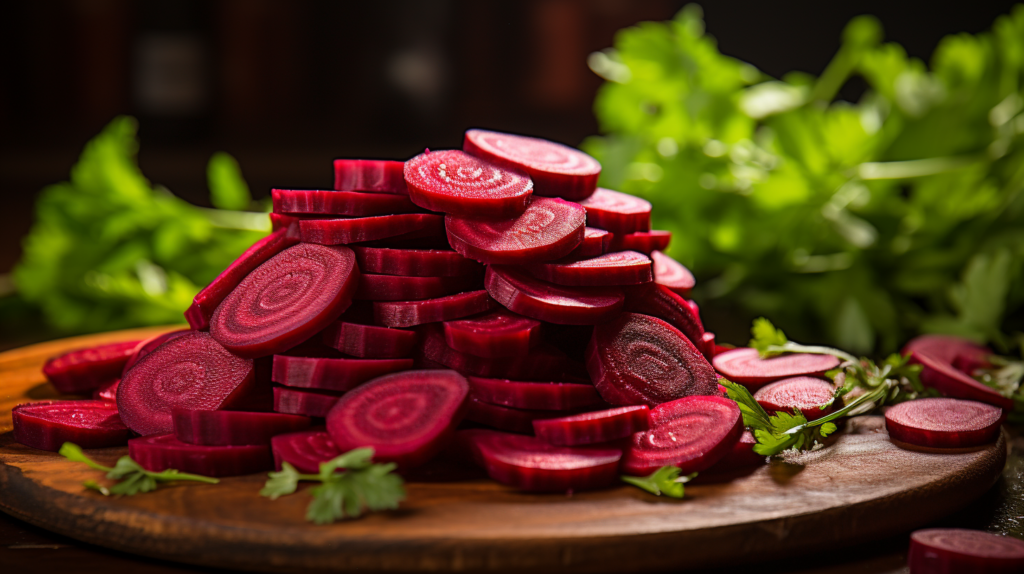
Understanding the Benefits of Beetroot
Beetroot is a nutritional powerhouse that offers numerous health benefits. This root vegetable is packed with vitamins and minerals such as vitamin C, folate, potassium, and iron, along with dietary fiber.
Studies suggest that consuming beetroot has potential benefits for overall health. It may reduce inflammation, improve blood pressure, and lower the risk of heart disease. Beetroot also contains nitrates, which are compounds that can enhance athletic performance. When consumed, nitrates are converted into nitric oxide, which can increase blood flow and oxygen delivery to muscles.
Nutritional Value of Beetroot
One cup of raw beetroot contains only 59 calories, making it a great option for those who are watching their weight. In addition to being low in calories, beetroot is rich in nutrients. It contains:
| Nutrient | Amount per cup (raw) |
|---|---|
| Carbohydrates | 13 grams |
| Fiber | 4 grams |
| Protein | 2 grams |
| Vitamin C | 11% of the Daily Value (DV) |
| Folate | 37% of the DV |
| Potassium | 10% of the DV |
| Iron | 6% of the DV |
Potential Health Benefits of Beetroot
Beetroot has been associated with numerous health benefits, including:
- Reducing inflammation: The anti-inflammatory compounds in beetroot, including betalains and polyphenols, may help to reduce inflammation and associated chronic diseases such as arthritis and certain cancers.
- Lowering blood pressure: Studies have shown that drinking beetroot juice or consuming beetroot supplements may lower blood pressure in people with hypertension. This is attributed to nitrates in beetroot that help to relax blood vessels and increase blood flow.
- Reducing the risk of heart disease: The nitrates in beetroot may also improve cardiovascular health by reducing blood pressure and enhancing blood flow.
- Promoting digestive health: Beetroot is a good source of dietary fiber, which can promote regularity and support gut health.
Overall, beetroot is a nutritious and healthful vegetable that offers numerous benefits. Whether you’re an athlete looking to enhance your performance, or someone looking to support overall health, incorporating beetroot into your diet is a great way to reap its many benefits.
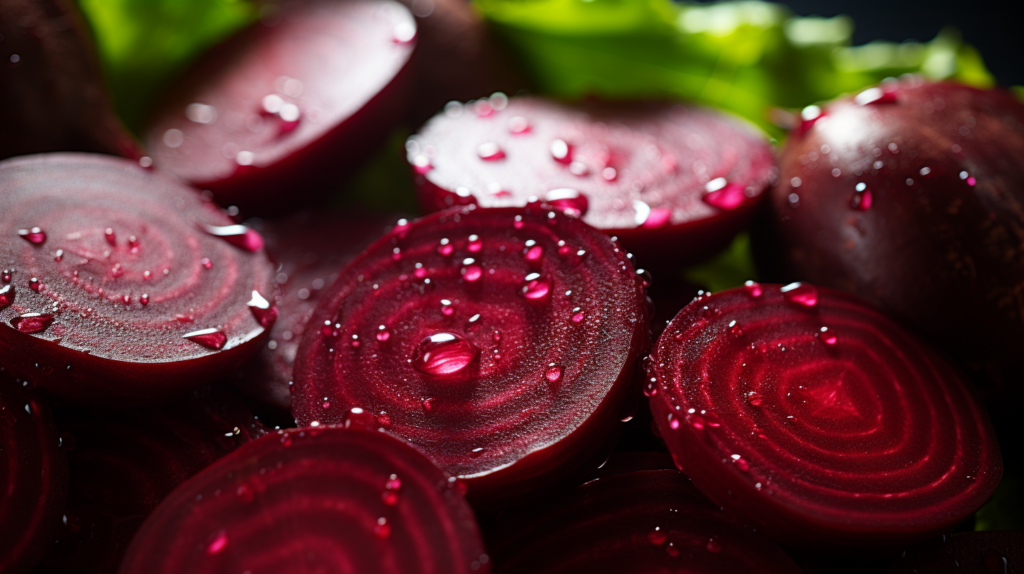
Beetroot for Enhanced Athletic Performance
Are you looking for a natural way to enhance your athletic performance? Look no further than beetroot.
Beetroot contains high levels of nitrates, which have been shown to improve endurance and stamina during exercise. These nitrates are converted into nitric oxide in the body, which helps to relax blood vessels and increase blood flow, providing more oxygen and nutrients to your muscles.
Studies have found that consuming beetroot juice or supplements can lead to significant improvements in performance, such as increasing time to exhaustion during exercise and reducing levels of perceived exertion.
Beetroot may also aid in post-workout recovery, thanks to its anti-inflammatory and antioxidant properties.
While it may not be a magic bullet for athletic performance, incorporating beetroot into your diet can provide a natural boost to your workouts.
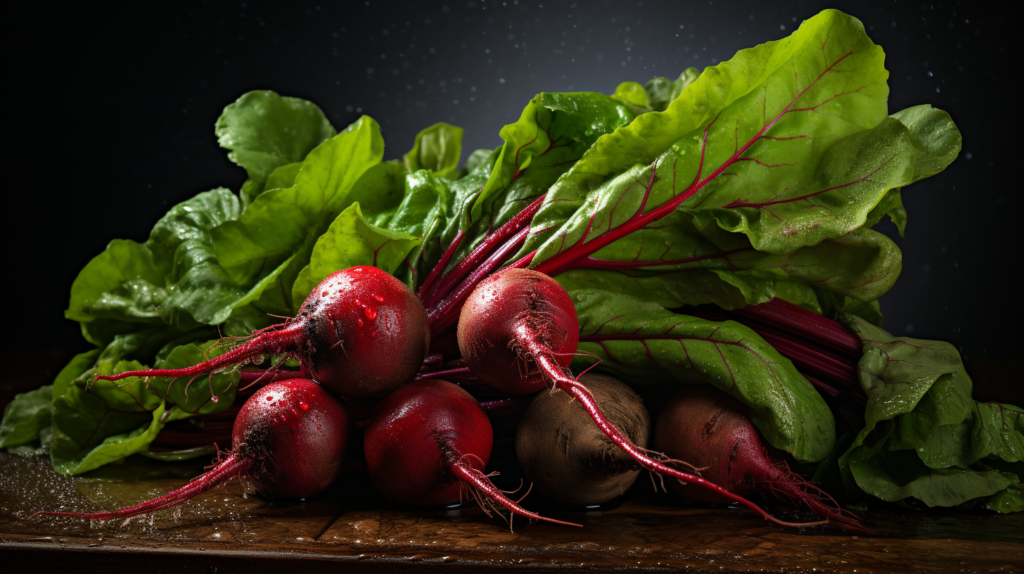
Beetroot for Blood Pressure Management
If you struggle with high blood pressure, beetroot may be a natural solution to consider. Studies have shown that the nitrates in beetroot can help to lower blood pressure by dilating blood vessels and increasing blood flow.
The nitrates in beetroot are converted to nitric oxide in the body, which relaxes and widens blood vessels, allowing blood to flow more easily. This can lead to a reduction in blood pressure and a decreased risk of heart disease.
In addition to its effects on blood pressure, beetroot also contains antioxidants and anti-inflammatory compounds that can help to reduce inflammation in the body, which is another risk factor for heart disease.
To incorporate beetroot into your diet for blood pressure management, try roasting or boiling fresh beetroot, or adding sliced beetroot to salads. You can also try drinking beetroot juice or taking beetroot supplements.
| Tip: | Beetroot juice can be high in sugar, so be sure to check the label and opt for unsweetened varieties when possible. |
|---|
If you are taking medication for high blood pressure, be sure to talk to your doctor before adding beetroot or any new supplement to your routine. While beetroot is generally safe for most people, it can interact with some medications and may lower blood pressure too much in combination with certain drugs.
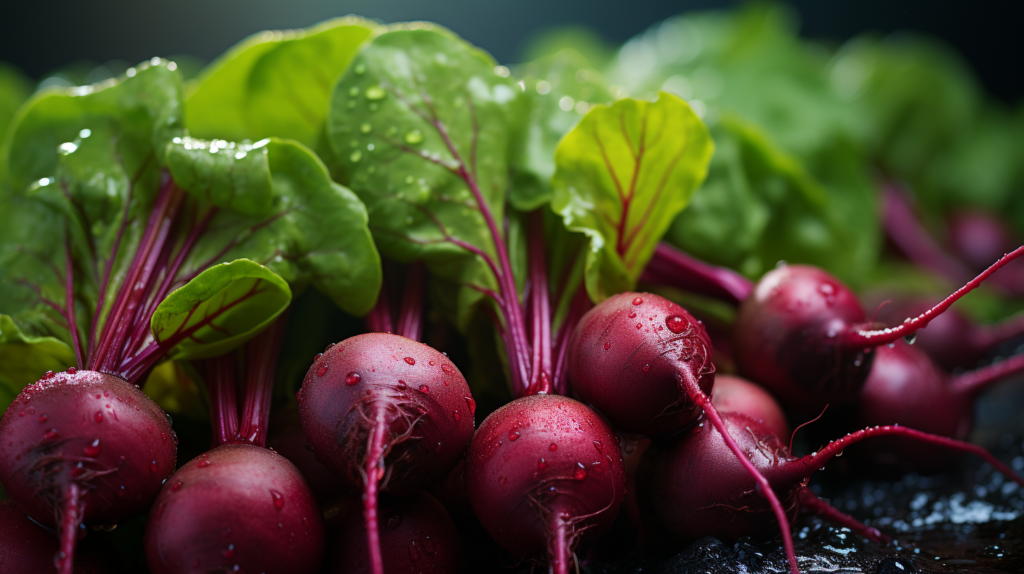
Beetroot for Digestive Health
If you’re looking for a natural way to support your digestive health, beetroot may be just what you need. This vibrant root vegetable is packed with nutrients that can help promote regularity, reduce inflammation, and support gut health.
How Beetroot Supports Digestive Health
Beetroot contains important nutrients that support digestive function, including fiber, magnesium, and potassium. These nutrients work together to help keep your gut healthy and functioning properly.
The fiber in beetroot helps to promote regularity by adding bulk to the stool and aiding in the movement of waste through the digestive system.
Magnesium is also beneficial for digestive health, as it helps to relax the muscles in the digestive tract and promote healthy bowel movements.
Potassium is essential for maintaining proper fluid balance in the body and can help prevent constipation by ensuring that stool stays soft and easy to pass.
Beetroot and Inflammation
Inflammation is a common problem in the gut, and it can cause a range of digestive issues, including bloating, gas, and discomfort. Fortunately, beetroot has anti-inflammatory properties that can help soothe inflammation and promote healing in the gut.
One of the key compounds in beetroot that helps to reduce inflammation is betaine. Betaine has been shown to reduce levels of inflammatory markers in the body, which can help to alleviate symptoms of digestive distress.
Supporting Gut Health
In addition to its other benefits, beetroot can also help to support the health of your gut microbiome. The gut microbiome is made up of trillions of bacteria that play a vital role in digestive health and overall well-being.
Beetroot contains prebiotic fibers, which act as food for the good bacteria in your gut. By nourishing these beneficial bacteria, beetroot can help to support a healthy and thriving gut microbiome.

Incorporating Beetroot into Your Diet
There are many ways to incorporate beetroot into your diet, from roasting it as a side dish to blending it into a healthy smoothie. You can also try juicing beetroot or grating it raw into a salad for a fresh and flavorful boost.
If you’re not a fan of the taste of beetroot, you can also try taking a beetroot supplement to reap the benefits of this powerful root vegetable.
By incorporating beetroot into your diet, you can support your digestive health and enjoy all the other benefits that this nutritious vegetable has to offer.
The Power of Beetroot Juice
Beetroot juice has become increasingly popular among fitness enthusiasts and athletes alike, thanks to its potential exercise-enhancing effects. Not only is it packed with nutrients, but it may also help improve endurance and performance during workouts.
Beetroot juice contains nitrates, which are converted into nitric oxide in the body. Nitric oxide helps to widen blood vessels, increasing blood flow and oxygen delivery to your muscles. This can improve endurance and delay onset fatigue during exercise.
According to a study published in the journal Nutrients, consuming beetroot juice for several days can improve running performance and increase time to exhaustion. Another study published in the Journal of the Academy of Nutrition and Dietetics found that drinking beetroot juice before exercise improved the performance of cyclists.
If you’re looking to incorporate beetroot juice into your diet, it’s important to choose a high-quality product. Look for juices that do not contain added sugars or other preservatives. Some juices may also be blended with other fruits or vegetables, which can affect their nutrient content and taste.
To get the most out of beetroot juice, it’s recommended to consume it before your workout. Aim for 2-3 hours before exercise to allow time for the nitrates to convert into nitric oxide. If consuming beetroot juice regularly, it’s important to also consume a balanced and varied diet to ensure you’re getting all the necessary nutrients your body needs.
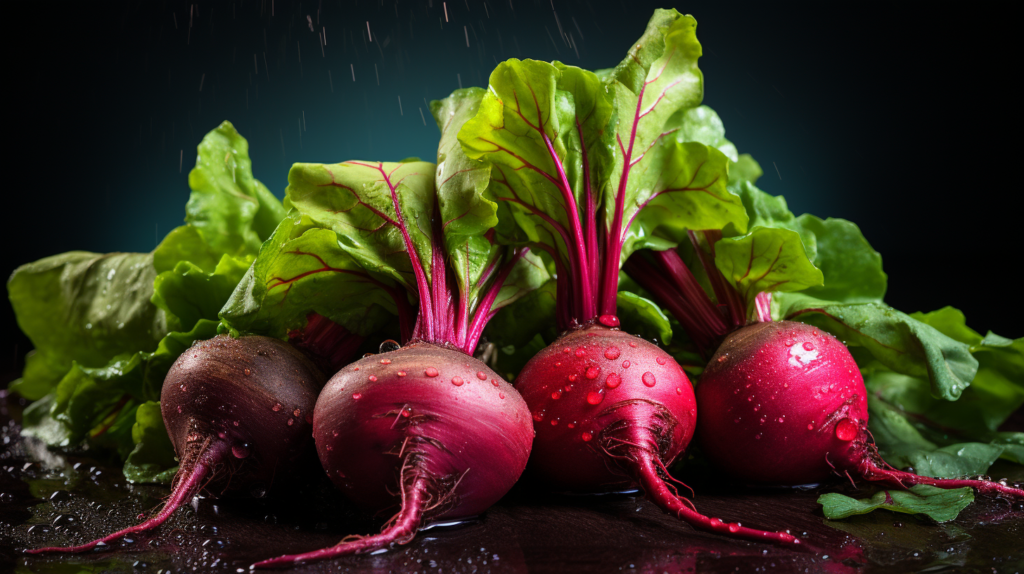
Beetroot Supplements for Performance Boost
If you’re looking for a convenient way to incorporate beetroot into your fitness routine, supplements may be a good option. Beetroot supplements are available in various forms, including capsules, powders, and gummies.
Be sure to choose a high-quality supplement from a reputable source to ensure safety and effectiveness. Look for supplements that contain standardized amounts of the active ingredient, nitrate, and have undergone third-party testing for purity and potency.
The recommended dosage of beetroot supplements varies depending on the product and individual needs. Follow the manufacturer’s instructions and consult with your healthcare provider before beginning any supplement regimen.
While beetroot supplements may offer the same performance-enhancing benefits as beetroot juice, they may not contain the same level of nutrients and antioxidants as whole beetroot. For this reason, it’s important to also incorporate whole foods rich in nutrients and antioxidants into your diet.
Beetroot supplements may also have potential side effects, including gastrointestinal discomfort and interactions with certain medications. Speak with your healthcare provider before taking beetroot supplements.
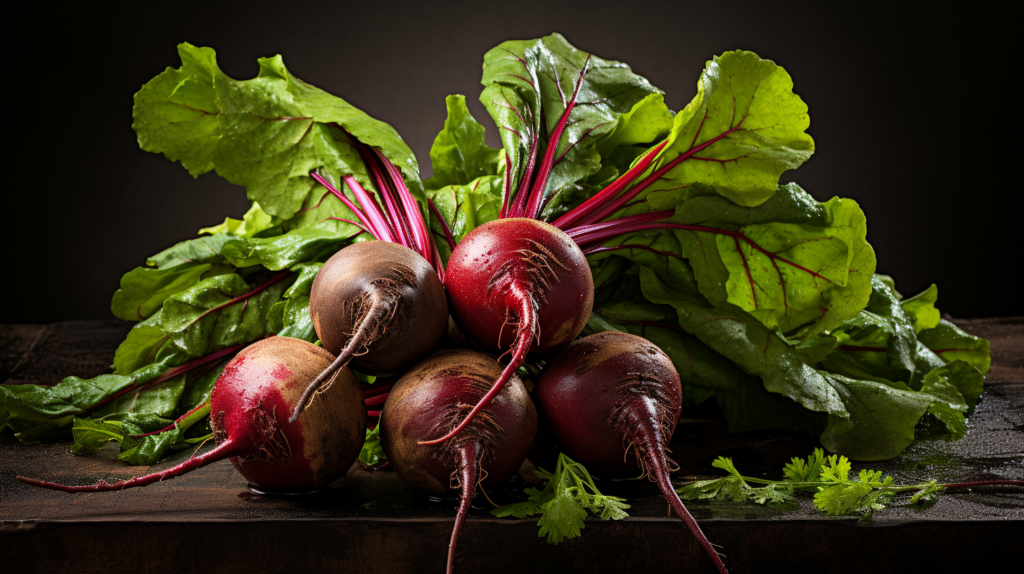
Beetroot for Detoxification
Beetroot is a powerful vegetable that can support the body’s natural detoxification processes. It contains a variety of nutrients and antioxidants that can help eliminate toxins and reduce inflammation in the body.
One of the primary ways that beetroot supports detoxification is through its impact on liver function. The liver is responsible for filtering toxins from the bloodstream and eliminating them from the body. Beetroot contains compounds that can help promote healthy liver function and support the body’s ability to detoxify.
Research has also shown that beetroot may help reduce oxidative stress and inflammation throughout the body, which can further support detoxification. This is because chronic inflammation and oxidative stress can impair the body’s ability to eliminate toxins and can contribute to the development of chronic diseases.
Incorporating beetroot into your diet is an easy and effective way to support your body’s natural detoxification processes. You can enjoy it cooked or raw, as a side dish or in a salad. You can also try juicing beetroot for a concentrated dose of nutrients and antioxidants.
However, it’s important to note that while beetroot is generally safe and well-tolerated, some people may experience side effects such as digestive upset or changes in urine color. Additionally, if you have a history of kidney stones or are taking medications that affect blood pressure, you should speak with your healthcare provider before incorporating beetroot into your diet.
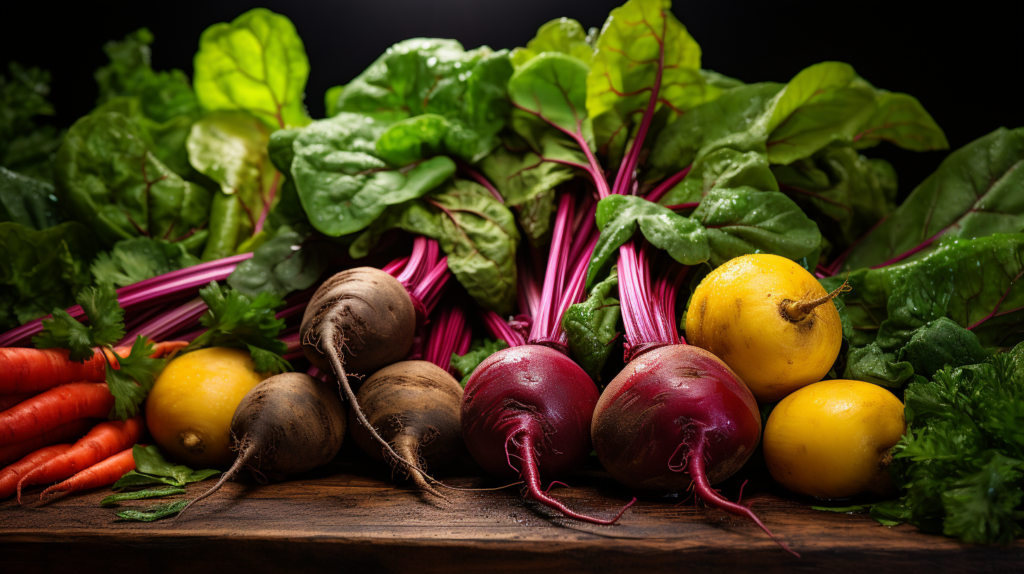
Conclusion
Beetroot is a powerhouse superfood that can offer a wide range of benefits for your overall health and fitness goals. From improved exercise performance and energy levels to better digestion and blood pressure management, this root vegetable has a lot to offer.
Incorporating beetroot into your diet can be as simple as adding it to your pre-workout smoothie or juicing it for a quick and convenient energy boost. You can also take advantage of the many beetroot supplements available on the market.
By consistently incorporating beetroot into your fitness routine, you can potentially enhance your athletic performance, support your digestive and liver health, and aid your body’s natural detoxification processes. So why not give beetroot a try and see how it can positively impact your health and fitness journey?
FAQ
Q: What are the health benefits of consuming beetroot?
A: Consuming beetroot can offer numerous health benefits, including improved exercise performance, blood pressure management, digestive health support, and potential detoxification effects.
Q: How does beetroot improve workout performance and energy levels?
A: Beetroot contains nitrates that can enhance blood flow, oxygen delivery, and exercise efficiency, leading to improved workout performance and increased energy levels.
Q: Can beetroot help with athletic performance?
A: Yes, beetroot has been shown to enhance athletic performance by improving endurance, stamina, and recovery. Its nitrate content can improve oxygen utilization, delay fatigue, and support efficient energy production during exercise.
Q: Is beetroot beneficial for managing blood pressure?
A: Yes, beetroot has been found to have blood pressure-lowering effects due to its high concentration of nitrates. These nitrates convert to nitric oxide in the body, which helps relax and dilate blood vessels, potentially reducing blood pressure.
Q: How can beetroot support digestive health?
A: Beetroot may support digestive health by promoting regularity, reducing inflammation, and supporting gut health. It contains dietary fiber, antioxidants, and anti-inflammatory compounds that can contribute to a healthy digestive system.
Q: What are the benefits of consuming beetroot juice?
A: Beetroot juice is a concentrated source of nutrients and can provide benefits such as improved exercise performance, increased stamina, and enhanced nutrient intake. It can be incorporated into the diet as a pre-workout drink or as part of a balanced meal plan.
Q: Are there beetroot supplements available?
A: Yes, beetroot supplements are available in various forms, including capsules, powders, and extracts. These supplements offer a convenient way to consume beetroot’s beneficial compounds, but it’s important to follow dosage recommendations and be aware of potential side effects.
Q: Can beetroot support detoxification?
A: Beetroot contains compounds that can support the body’s natural detoxification processes, particularly in relation to liver health. It may promote liver function and aid in the elimination of toxins from the body.














